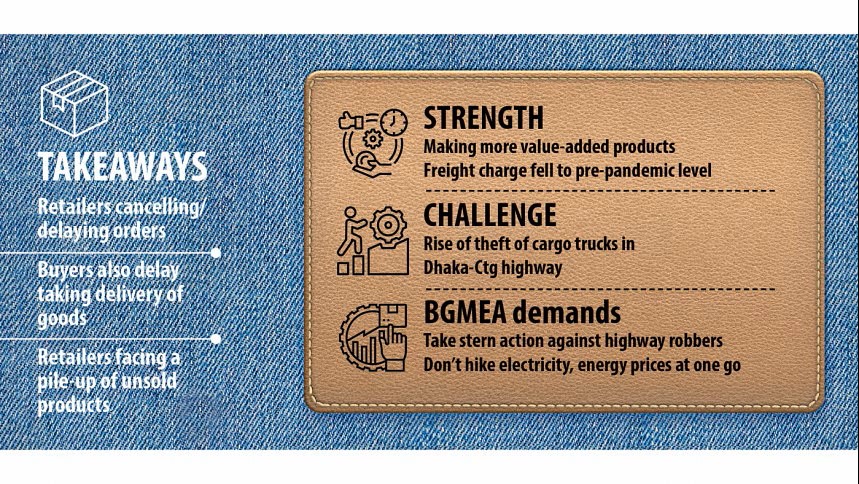International clothing retailers and brands are either cancelling their orders to garment factories in Bangladesh or putting them on hold because of the persisting volatility in the global economy, higher inflation, and stockpiling of unsold goods.
Inflation in Europe and the US, the two largest markets for garment items made in Bangladesh, as well as many other export destinations has remained at an elevated level despite falling in recent months, meaning a continued struggle for consumers.

“This has forced international retailers and brands to cancel orders even for the goods that are ready to be shipped from factories,” said Faruque Hassan, president of the Bangladesh Garment Manufacturers and Exporters Association (BGMEA).
He made the comments at a press conference at the BGMEA office in Dhaka yesterday.
Without giving any specific number, Hassan said orders have declined to such a level that some suppliers are running their factories four to five days a week in order to retain buyers while keeping the production cost lower.
“Buyers are even asking many local suppliers to share the losses they are incurring owing to the fall in sales caused by a lower demand.”
The BGMEA chief asked the government to reconsider the implementation of the latest hike in gas and power tariffs since the spike in energy costs would create an extra burden on the manufacturers and affect their competitiveness in the global markets.
The hikes should be implemented in phases, he said.
The government raised the electricity tariff by 5 per cent at the retail level on January 31, the second hike in 19 days. On January 18, it increased the retail price of gas by 14.5 per cent to 178.9 per cent for industries, power plants and commercial establishments.
“If the prices of energy are adjusted downwards in the local market following the decline in prices of liquified natural gas, the prices of many other things will fall in the domestic market. This will also lower the cost of production,” Hassan said.
Despite the economic volatility at home and abroad stemming from the dragging Russia-Ukraine war and the global energy crisis, the shipment of garment items from Bangladesh is increasing.
Hassan credited the depreciation of the local currency against the US dollar and the export of high-value-added items for the increased earnings.
The taka has lost its value by about 25 per cent against the American greenback since the war erupted, making the goods manufactured in Bangladesh cheaper in the export markets.
Thus, the garment shipment, which accounted for about 85 per cent of national exports, rose 14.31 per cent year-on-year to $27.41 billion in the July-January period of the current financial year.
In Bangladesh, many local garment factories are capable of producing jackets worth $30 to $35 per piece, which indicates that the country is shifting to the production of value-added apparel items from basic ones.
Moreover, a lot of orders are moving away from countries such as China, India, Pakistan, Vietnam, and Myanmar to Bangladesh, helping the readymade garment sector to keep growing even during turbulent times.
In another encouraging development, freight costs have declined and returned to the pre-pandemic level, said a number of suppliers.
Hassan also expressed concerns about the gradual deterioration of the image of the garment industry because of an alarming rise in robberies facing goods-laden trucks on the Dhaka-Chattogram Highway.
“Over the last 15 years, a syndicate of robbers has stolen garment items worth hundreds of crores of taka from more than 2,000 export goods-laden covered vans plying on the highway.”
Last month, a buyer in Brazil sent a video clip to a local supplier where the buyer showed that 8,000 pieces out of 26,000 units of clothing items were missing from the cartons that he received from the Bangladeshi firm.
It happened because one Shahed and his accomplices stole the goods from the trucks. The members of the Rapid Action Battalion later arrested four along with Shahed and recovered the stolen goods, Hassan said.
The BGMEA chief urged the government to take stern action against the miscreants involved in the theft of export-bound goods.
“If necessary, laws should be amended to make tough provisions to punish the thieves as such incidents hurt the image of the country and the sector.”
The entrepreneur alleged that such thefts are taking place regularly as convicted persons are coming of jail on bail and are getting involved in the same crimes.
For instance, Shahed has been continuing the robbery of goods on the Dhaka-Chattogram Highway for many years. He was convicted in 17 to 18 cases, he said.
In many instances, criminals are stealing goods in collusion with a section of covered van operators, drivers, and buying houses, Hassan added.
















